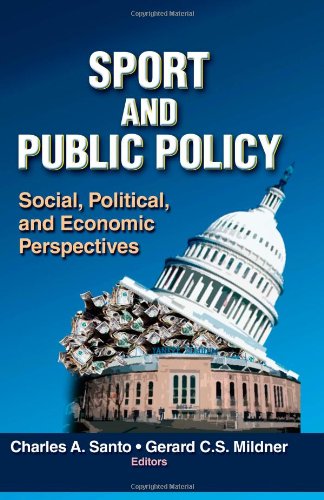

Most ebook files are in PDF format, so you can easily read them using various software such as Foxit Reader or directly on the Google Chrome browser.
Some ebook files are released by publishers in other formats such as .awz, .mobi, .epub, .fb2, etc. You may need to install specific software to read these formats on mobile/PC, such as Calibre.
Please read the tutorial at this link: https://ebookbell.com/faq
We offer FREE conversion to the popular formats you request; however, this may take some time. Therefore, right after payment, please email us, and we will try to provide the service as quickly as possible.
For some exceptional file formats or broken links (if any), please refrain from opening any disputes. Instead, email us first, and we will try to assist within a maximum of 6 hours.
EbookBell Team

4.3
68 reviewsSports figures, events, and organizations affect our society in vast, varied, and sometimes unexpected ways. To gain a broad-based understanding of how sport interfaces with public policy issues, a variety of viewpoints must be considered. Sport and Public Policy: Social, Political, and Economic Perspectives is the only text that examines some of the most compelling policy issues affecting the sports world from an interdisciplinary perspective—including economics, history, urban planning, not-for-profit administration, public health communications, political science, and philosophy. With contributions from a wide range of scholarly disciplines, this contemporary resource enhances traditional conversation and gives readers a fresh outlook on economic and political issues in sport.
Sport and Public Policy presents a contemporary view of how to understand and analyze complex and controversial topics. It begins by examining issues related to professional sports—including the unique nature of American sports leagues, the decisions and conflicts involved in the organization of sports leagues and events, and labor strikes and conflicts. It then examines professional sports, cities, and public finance. Readers are drawn into thought-provoking discussion of issues such as the public investment in sports facilities and recent trends in stadium and arena construction. The book also presents an example of a unique model of not-for-profit community ownership in action, which readers can implement in their own cities.
Sport and Public Policy explores amateur sports by presenting a fresh perspective on the link between sports and society, the dwindling levels of African-American participation in baseball, and whether or not the National Collegiate Athletic Association’s actions align with its stated principles and values. It also challenges the reader to think globally through a discussion of how sports affect and are affected by international relations, how a changing world economy is affecting the Olympic games, Major League Baseball’s efforts at global expansion, and the effects of global consumer marketing efforts.
The chapters encourage readers to consider their role as participants in sports and use their great power to make individual choices that influence their communities. To enhance the learning experience, Sport and Public Policy offers the following:
An application and implementation section in select chapters helps readers understand how to apply the content in their own roles in the sport industry or society. The case studies added to most chapters illustrate how the information and research are being applied in the real world. Some of the hottest topics in the sports world are covered from a public policy perspective, giving readers a new angle from which to analyze issues now and in the future.
Sport and Public Policy is a timely resource that will be valued by many. Researchers will use it as a springboard for further study of how sport affects our society economically, socially, and politically. Practitioners and anyone else interested in the role of sport in America will find the book creates a critical new awareness of sport’s interface with public policy and the potentially far-reaching implications of their decisions.